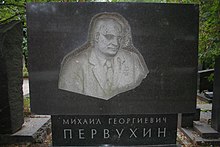Mikhail Georgievich Pervukhin

Mikhail Pervukhin ( Russian Михаил Георгиевич Первухин , scientific. Transliteration Mikhail Georgievic Pervuchin ; born October 1 . Jul / 14. October 1904 greg. In the village Yuryuzan, in the district of Zlatoust , Ufa Governorate ; † 22. July 1978 in Moscow ) was a soviet politician .
biography
Education, political beginning
Pervukhin attended school in Zlatoust and was a member of the Komsomol . He was a member of the Communist Party of Russia from 1919 and appeared here for the first time as a member of the commission for the nationalization of the assets of the bourgeoisie . In the autumn of 1920 he took part in the suppression of a peasant uprising. From January 1921 he headed the local newspaper Proletarischer Gedanke , from October 1921 he was head of the political education and member of the management of the local Komsomol. Then he moved to Moscow, where he graduated from the Institute for Economics in 1929. This was followed by senior positions in Soviet industry, and in 1937 he moved to the People's Commissariat for Heavy Industry.
Ascent
Pervukhin began to attract attention in 1938 when he was appointed Deputy People's Commissar (= Minister) for Heavy Industry in the Molotov Cabinet . In 1939 he became a member of the Central Committee (ZK) of the WKP (B) and at the same time People's Commissar for power plants and the electrical industry. Already at the time of the Second World War he was one of the deputy chairmen of the Council of People's Commissars (name from 1946: Council of Ministers) under Stalin . From 1940 to 1943 he headed the Council for Electricity and Fuel. From 1943 to 1950 he was People's Commissar and Minister for the Chemical Industry.
From 1952 to 1957 he was finally a full member of the highest political body in the country, the Politburo of the Communist Party of the Soviet Union (name from 1952 to 1966: Presidium). In 1953 he remained Deputy Prime Minister in the Malenkov cabinet and in 1955 in connection with the fall of Malenkov in the Bulganin Cabinet First Deputy Prime Minister. In the government he was initially responsible as a minister for the complex power plants, electrical industry and fuel industry, from 1957 to 1958 for the "middle" mechanical engineering. From 1956 he was also given the key position as head of the Office for the State Plan (also known as the State Economic Commission, thus supervisor of all supervisors ). With Khrushchev the state apparatus received a significant increase in power in the party.
descent

Together with the majority (7 out of 11) of the presidium members Malenkov (now energy minister), Molotov (foreign minister), Kaganowitsch (deputy prime minister), Bulganin (prime minister), Voroshilov (president of the Supreme Soviet, i.e. state president) and Saburov (minister of mechanical engineering ) In 1957 he tried to overthrow the incumbent First Secretary of the Central Committee of the CPSU Khrushchev. However, the latter called a special meeting of the Central Committee - the members were hurriedly flown in with the help of Marshal Zhukov - and in return most of the Khrushchev opponents were voted out by the Central Committee. Pervuchin is demoted to the presidency candidate. On the XXI. At the party congress of January 1959, he and Saburov were again heavily criticized as "dogmatists" by Khrushchev. In 1961 he lost his position as a candidate for the presidium . After that he was not even represented as a delegate in the Central Committee.
From 1958 to 1962 - that is precisely during the time of the construction of the Wall in Berlin - he was ambassador of the USSR in the GDR and finds mention in the historical correspondence between Ulbricht and Khrushchev in June 1961. At the end of his career he worked on secondary post at Gosplan .
Honors
- He was awarded the Order of Lenin five times.
- Hero of Socialist Labor
- Order of the October Revolution
- Order of the Red Banner of Labor
literature
- Spuler: Regents and Governments of the World , Minister-Ploetz Vol. 4 u. 5, 1972, 1964.
- Merle Fainsod : How Russia is governed , Kiepenheuer & Witsch, 1965.
- Michel Tatu: Power and Powerlessness in the Kremlin , Ullstein, 1967.
- Jan Foitzik: Perwuchin, Michail Georgijewitsch . In: Who was who in the GDR? 5th edition. Volume 2. Ch. Links, Berlin 2010, ISBN 978-3-86153-561-4 .
Web links
| personal data | |
|---|---|
| SURNAME | Perwuchin, Mikhail Georgievich |
| ALTERNATIVE NAMES | Первухин, Михаил Георгиевич (Russian) |
| BRIEF DESCRIPTION | Russian politician |
| DATE OF BIRTH | October 14, 1904 |
| PLACE OF BIRTH | Yuryuzan, District Zlatoust , Ufa Governorate |
| DATE OF DEATH | July 22, 1978 |
| Place of death | Moscow |